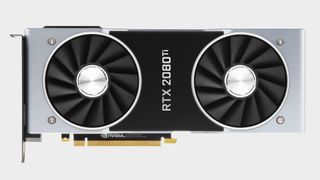Should I buy an Nvidia RTX 2080 Ti graphics card?
Nvidia's RTX 2080 Ti was always going to be hit hardest by the RTX 30-series.

Simple answer: No, you shouldn't buy an RTX 2080 Ti right now. Don't get me wrong, the RTX 2080 Ti is a fantastic graphics card. It's able to deliver 4K graphics and a taste of the good life thanks to acceleration for real-time ray tracing technology. Yet it's also recently been superseded by both the RTX 3080 and RTX 3090.
Only if the RTX 2080 Ti is beyond cheap would we recommend it over taking a chance on shopping around for an Nvidia Ampere graphics card. And I'm talking about a huge discount on the original MSRP of $1,200. We're sure to see some graphics card deals during Amazon Prime Day, and Black Friday shortly thereafter, but significant discounts on a high-end card such as this are unlikely.
That's because Nvidia will have eased off the RTX 2080 Ti throttle in anticipation of the RTX 30-series availability in September, meaning fewer and fewer RTX 2080 Ti cards would've made it into retail channel over the Summer. What that means is you're only likely to find an RTX 2080 Ti on sale right now if it's second-hand.
What is the RTX 2080 Ti?
GPU - Turing TU102
Streaming Multiprocessors - 68
CUDA Cores - 4,352
Tensor Cores - 544
RT Cores - 68
Video memory - 11GB GDDR6
Memory bus - 352-bit
Base Clock - 1350MHz
Boost Clock - 1635MHz
Memory Speed - 14 GT/s
Memory Bandwidth - 616GB/s
TDP - 260W
Launch Price - $1,200
The RTX 2080 Ti was the most powerful gaming graphics card in the world until just last month. It features 4,352 CUDA Cores, by far the most found in any GeForce graphics card of the Turing generation, and it backs that up with 11GB of GDDR6 memory.
The most commonly referenced RTX 2080 Ti is the Founders Edition, a design of Nvidia's own making, although you're more likely to find a third-party graphics card in the market today, such as those from ASUS, MSI, and Gigabyte. These all offer the same fundamental promise of great 4K performance, plenty of memory, and real-time ray tracing. Speaking of which, the RTX 2080 Ti led the charge in RTX adoption, and still offers decent performance in many games with RTX on.
What are the alternatives to the RTX 2080 Ti?
If you're in the market for the level of 4K and 1440p gaming, or exceedingly high refresh rates at 1080p, that the RTX 2080 Ti is able to offer, then you've got plenty of options. According to our super high-tech GPU choosing algorithm thingamabob (me), any one of the recently announced Nvidia RTX 30-series cards should suffice.
You've got two options to choose from today and one coming up in the near-future: The RTX 3090, RTX 3080, and RTX 3070 (launching October 29). The RTX 3090 is, of course, the powerhouse of the lineup and features 10,496 CUDA Cores and 24GB of GDDR6X memory. Damn. That will set you back a cool $1,499—somehow making the RTX 2080 Ti look cheap.
PC Gamer Newsletter
Sign up to get the best content of the week, and great gaming deals, as picked by the editors.
The RTX 3080 is a little easier on the wallet at $699, and not too far off in terms of gaming pace, either. The RTX 3070 is the most affordable of the lot today at just $499, though there's a bit of a wait. According to Nvidia, even the cheapest of the lot will rival the RTX 2080 Ti in gaming performance.
Should I buy the Nvidia RTX 2080 Ti and at what price?
The answer is still no. As I explained before, the RTX 2080 Ti is now roughly equivalent to a $499 graphics card at the worst of times, and even at the best of times it falls short of the $699 RTX 3080.
It's not intrinsically a bad card, per se, it's just been replaced with a newer, cheaper option. If you were, to say, pick up an RTX 2080 Ti in good nick on the web for less than $499, you're laughing. If you don't care for Ampere's improved ray tracing performance, and you're keen for 11GB of the good stuff (GDDR6), perhaps you should even be willing to spend a little bit more on the RTX 2080 Ti.
If you can find one, that is. We don't expect many people to be willing to sell off their fairly modern $1,200 (or more) graphics card for as quite a substantive loss as that, and you're not going to find many retailers with any going spare, either.

Jacob earned his first byline writing for his own tech blog. From there, he graduated to professionally breaking things as hardware writer at PCGamesN, and would go on to run the team as hardware editor. Since then he's joined PC Gamer's top staff as senior hardware editor, where he spends his days reporting on the latest developments in the technology and gaming industries and testing the newest PC components.
Most Popular


